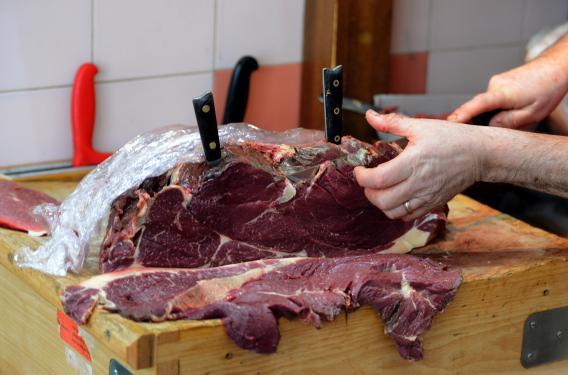This post originally appeared on Quora.
Answer by Domhnall O’Huigin, Dublin resident:
Most of you (and almost all the Europeans) will have heard of the current scandal in European agribusiness relating to the misrepresentation of horse flesh as beef or other meat products, most often, but not exclusively, in ready meals and the like.
The potential motive for a meat supplier to do this is not hard to guess; it is a far cheaper product than beef, pork or lamb, and while it has a distinctive taste on its own, it is not so vastly different from beef that a blend of beef and horse would taste “unusual.” Especially in something like a burger, which is going to be slathered in sauces anyway, let alone as part of a lasagna. I personally don’t mind the thought of it and enjoy the taste. I’m very far from alone in this, but there are many cultures where horseflesh is taboo and whether or not you are eating Black Beauty isn’t really the point. The point is that you are eating a product that claims to be one thing (beef) and is in fact a very different one (horse). “Beef” is generally a protected description around the world, with various controls and standards and so on. While it isn’t true to say that the trade in horseflesh is completely unregulated, it is safe to say that meat that isn’t meant to be there in the first place, has not passed any standards, except - hopefully - that it is dead.
Proof of this, were it required, is provided by the recent discovery of the animal painkiller bute or Phenylbutazone in the human food chain. While I do not especially doubt the chief medical officer in the article cited when she says the risk is “low,” bute is most definitely the sort of thing that will ruin your day (including by possibly bringing it to an unanticipated end) should you eat enough of it.
So we have the why, the how is something that unfolds daily like some awful origami, how is it your fault? Or more accurately, our fault?
This is satisfyingly straightforward: we asked for it.
No, we did not, naturally, waltz into our local supermarket and ask to be lied to, fed dangerous chemicals and fraudulently sold food that may be against our deep personal and/or religious principles to consume.
But as consumers, we have consistently said that price is our single most important consideration when it comes to grocery shopping. It isn’t only food of course: We expect pairs of jeans at impossibly cheap prices, most of us now balk at spending more than a few dollars or euros for socks for example. Lawnmowers, televisions and DVD players, garden furniture, power tools and camping equipment—we expect pricing that anyone with a calculator and half a brain can see does not make economic sense.
On the infrequent occasions when we think about it at all, we tell ourselves that this is due to economies of scale. Or we drink the Kool-Aid and buy into the press-puff-pieces about the latest brilliant advance in logistics efficiency. With very few exceptions, there are no such new advances, they all depend on slave—or at best, unethical—labor, and corn ers cutsomewhere along the line.
But nowhere is the contrast between the cost of production and the price we pay as blindingly obvious as in the case of food.
Do you really think it is possible to bring an individual burger to market for 20 cents (in euros) retail? Given how labor and capital-intensive farming is? Given the high costs associated with transporting food? Here is a provoking account of how the costs of that “20 cent” burger breakdown (or rather how they don’t).
The answer of course is that it isn’t. In the case of the food examples above, the large multiples squeeze their suppliers until their ribs crack and they in turn squeeze their suppliers (farmers and the like) until there simply is no more to give. Because if they don’t, we consumers will go to a supermarket that will. There is a reason the likes of Tescos, ASDA, etc., spend so much money telling us that their milk is 2 cents cheaper than the competition: because that is how price-sensitive we are as consumers.
And like weeds in the cracks of a pavement, here the unscrupulous (or the desperate) suppliers flourish. I can close my eyes and hear how they would justify it— it is all meat, they love it in France and Slovenia, etc.
You buy your food so cheaply because, bluntly, it isn’t what you think it is or it hasn’t been produced with the sort of health safeguards you think are in place.
So your “beef” is pork or horse or dog or some damn thing. Wake up and smell the free-trade coffee (produced in horrific, slavery conditions but by a company whose name is registered in the Cayman Islands as “Free Trade Coffee,” because you know, truth in advertising).
Of course you could always shop local, support your local grocery supplier or butcher. If you can find one anymore. You and I didn’t want them, you see.
More questions and posts on Horsemeat Scandal (January 2013):
